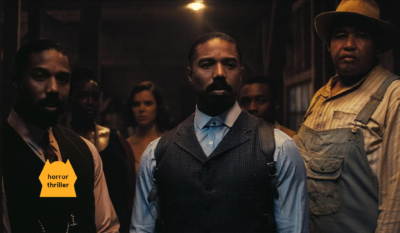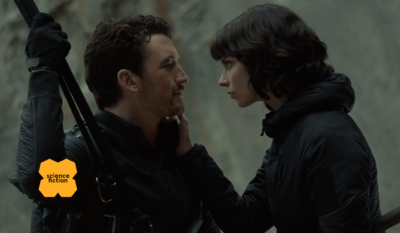Set in 1820s West Africa, The Woman King follows an all-female group of warriors as they prepare to face the rising threat from a rival kingdom.
In some ways, The Woman King is a quintessential historical action epic—think Ben-Hur or Glory. It's immersive with its impeccable sets and costumes recreating 1820s Africa, engrossing with its storytelling, and captivating with its action. It's the kind of big studio blockbuster we don't often see anymore. But in other ways, it's unlike anything else in the genre—and a watershed moment for action movies—because of how its story centers on the experience and plights of black women without focusing on their relation to whiteness and men—Top Gun: Maverick, eat your heart out. Of course, those elements are there. But director Gina Prince-Bythewood moves them to the periphery. Instead, her heroines, led by General Nanisca (Viola Davis who disappears into the role), are front and center.
At the same time, Prince-Bythewood directs The Woman King as a full-throated historical action epic that is simply weightier because her protagonists aren't the typical ones you'd see in a studio blockbuster.
However, she doesn't treat them any differently in the same way she didn't treat the queer characters in her underrated fantasy action The Old Guard any differently than straight heroes—#JoeandNicky4Ever. There's no better example than the movie's sensational opening scene. In the dead of night, a group of male soldiers is relaxing around a campfire when the Agojie, a group of sword-wielding female warriors from the West African kingdom of Dahomey, rise from the brush—and oiled for the gods—with Nanisca at the center. It's the kind of cheer-worthy entrance that heroes of their caliber deserve and Prince-Bythewood knows it.
What follows is one of the most impressive action setpieces of the year as the Agojie tear through the group of men viciously but gracefully. And just like the warriors, it is captured on camera with the same grace—there's a sense of space and geography that makes the scene almost feel like a choreographed dance. The women are there to save women taken from their kingdom by the Oyo Empire, who intends to sell their captives to white colonialists. General Nanisca, along with her two closest comrades Izogie (Lashana Lynch) and Amenza (Shelia Atim), returns to the kingdom as revered as warriors should be. While their enemies chide King Ghezo (John Boyega) for using women as his main line of defense, he knows what they are capable of.
The movie then transforms into a classic hero's journey as we're introduced to Nawi (Thuso Mbedu), an orphan whose adoptive parents gift her to the king after her disobedience becomes too much to handle. But instead of being forced into grueling training with the Agojie, she willingly accepts the opportunity to become a warrior—igniting a running theme of finding one's agency. The movie spends much of its second act as a Shakespearean drama as tensions continue to rise between Dahomey and the Oyo, Nawi struggles through training, and Nanisca faces a trauma from her past as the king prepares to make her his successor. However, the movie doesn't become any less thrilling. The stakes are never lessened, if anything the introduction of each character's arc raises them.
Prince-Bythewood knows the key to good action is good character development. Each member of the Agojie is etched in such beautiful detail that you can clearly see how their past—and the world they live in—informs their present.
Take for example Amenza's careful counseling of Nansica as various threads from her past come back to haunt her. Her measured response—and consultation with mystical nuts—never feels false because the relationship between the pair is well-defined. You can easily understand why they've been confidants for so long. The same goes for the way they fight—it feels in control. Like they're listening to each other's bodies only in the way that sisters forged in battle can.
Multiple story threads involving slavery, colonialization, and sexual assault weave themselves together into an ignition wire that is ignited into a stellar third act that works because of all the groundwork set in place—and in one case, literally. The brutal action feels dangerous because we are made to care deeply for these women. Every single one of them. Even those whose names we don't get to learn. That is The Woman King's most impressive achievement among its many technical and social achievements.
Don't get me wrong, though. The Woman King is exactly what moviegoers are expecting of it.
Nail-biting action, engrossing political intrigue, awe-inspiring heroics, even a muscled-in romantic subplot—the folly of many of its predecessors. But because of the simple fact that it takes place in a location, time, and with faces we don't often get to see as heroes, it feels completely fresh. The same way it felt when Black Panther broke the glass ceiling for superhero movies or Crazy Rich Asians for romantic comedies. The beats we know and love are there. But Prince-Bythewood gives them a new rhythm. The Agojie deserve to have their stories told as epically as Maximus Gladiator or Achilles in Troy. And Viola Davis, Lashana Lynch, Sheila Atim, and Thuso Mbedu are up to the task—and then some.
ADVERTISEMENT
More movies, less problems
- Jordan Peele Unleashes the First Trailer for ‘HIM'
- ‘Sinners' is the best movie of the year | movie review
- Romantic sci-fi thriller ‘The Gorge' hits its mark | movie reivew
Hey! I'm Karl. You can find me on Twitter and Letterboxd. I'm also a Tomatometer-approved critic.
💌 Sign up for our weekly email newsletter with movie recommendations available to stream.
ADVERTISEMENT
Hey, I'm Karl, founder and film critic at Smash Cut. I started Smash Cut in 2014 to share my love of movies and give a perspective I haven't yet seen represented. I'm also an editor at The New York Times, a Rotten Tomatoes-approved critic, and a member of the Online Film Critics Society.


Comments are closed.